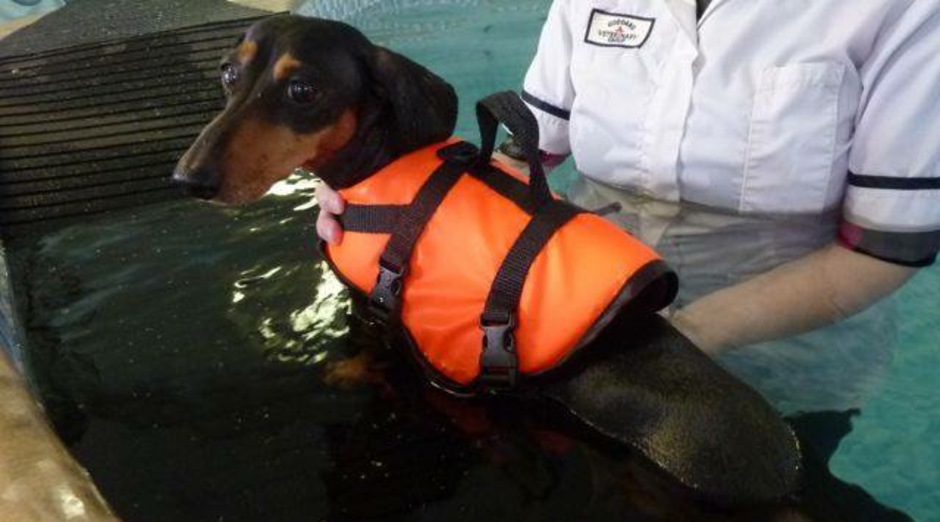
Rehabilitation
Whether your Dachshund has surgery or not, your dog will benefit from rehabilitation by a qualified canine rehabilitation therapist (either a Physiotherapist or Veterinary Surgeon). Services are usually available by referral from your own vet or referral specialist.
Canine rehabilitation consists of a thorough evaluation and a progressive treatment plan that addresses strength, range of motion, pain or discomfort, balance, coordination, quality of mobility and walking, and overall function. The therapy plan is continually re-evaluated over several weeks, updated and follows all restrictions set by the referring vet or specialist.
The therapy plan may consist of balance, coordination and strengthening exercises, manual therapies, gait retraining, acupuncture, joint mobilisation, and modalities such as laser, muscle stimulation, swimming or underwater treadmill.
Some elements of the therapy plan can be done at home by you, while others will require you to take your dog to the vet's or physiotherapist's surgery.
We have 4 videos of webinars presented by Dr Marianne Dorn (The Rehab Vet) which you can access here. Marianne is the author of The IVDD Handbook (publ. 2022).
The following webpage has updated information on crate size and whether to go for a crate or pen:
Choosing a crate or pen: https://therehabvet.com/2017/
There are three pages of Dr Dorn's website that contain fairly comprehensive information about what to do when your dog goes down with IVDD (each has details of clinical signs, treatment options, what to do, setting up a crate, basic lifestyle advice, and basic home nursing care for the collapsed dogs).
‘IVDD dogs who can walk’ https://therehabvet.com/2017/
‘IVDD dogs who can’t walk’ https://therehabvet.com/2017/
‘IVDD dogs with no deep pain’ https://therehabvet.com/2017/
Crate rest for dogs: advice for vets by Dr. Marianne Dorn. Print a copy to give to your vet.
Walking with your recovering dog by Dr. Marianne Dorn.
For details of support available and recommended products to help during recovery, visit our Support and Links pages.
Sling walking your dog after surgery
YouTube video by Veterinary Specialist Centre (USA)
Note: Your vet will probably advise you to use a front harness which goes across the breastbone, rather than a collar. The back sling may also be able to be attached to the harness so you can walk your dog without any jarring. (GingerLead Support Sling)
Emergency symptoms during recovery
You need to keep an eye open for potential problems while your Dachshund is recovering from an IVDD incident. If your dog has any of these symptoms, call your vet for advice:
- Pain, or a deterioration in mobility (e.g. increased wobbliness or paralysis)
- Sickness or diarrhoea, which may be caused by painkillers, antibiotics or other medications
- Difficulty going to the toilet (pee or poo)
- Blood in the urine or stools
- Stops eating or drinking and becomes lethargic
Why your Dachshund with IVDD should not see a Chiropractor
There's an article from DodgersList explaining why a Dachshund with back problems should not see a Chiropractor. The paper concludes with this:

